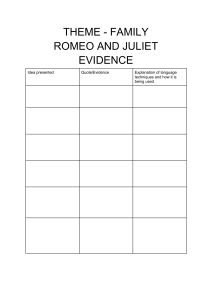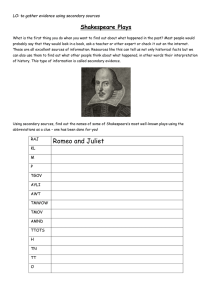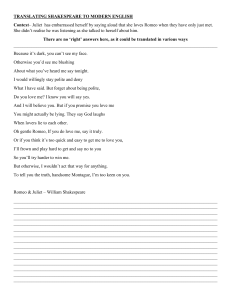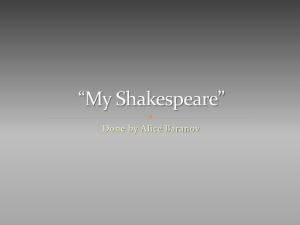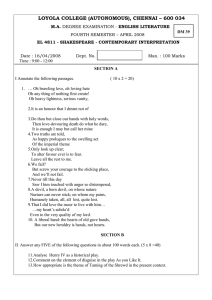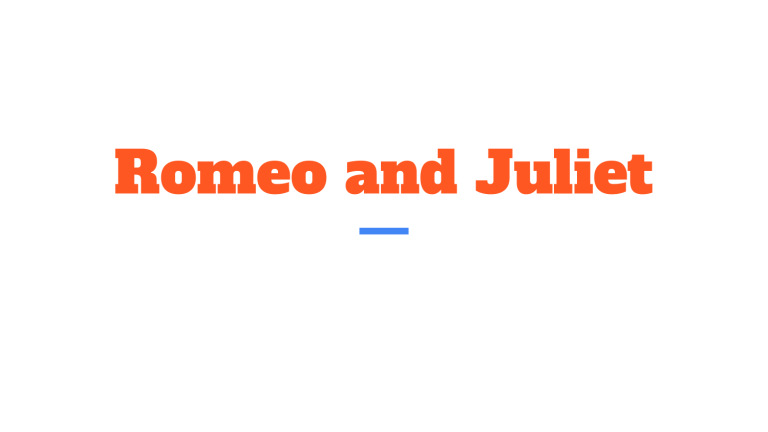
Romeo and Juliet Props Needed for Romeo and Juliet Swords and DaggersBottle of poisonMasks for the masquerade ballFamily crests for Capulets(red)& Montagues(blue Get your Journal and Title the nexT page ACT I Scenes 1 and 2. Copy the following vocabulary words: Quarrel- to argue or fight “Bite my thumb”- Insult expressing frustration or anger. “Master”- Employer Foes-enemies 5/3/19 Get your folder and your Journal. In your Journal, begin drawing the family tree. https://youtu.be/FZBjlKf 3AW4 In Two minutes: https://youtu.be/uOkJc1 4zCAs William Shakespeare AKA “the bard” 1564-1616 Shakespeare’s Language Shakespeare’s Language ■ Why do people have trouble understanding his writing? Shakespeare’s Language ■ A lot has happened to the English Language since the late 1500’s ■ Shakespeare was a poet, as well as an actor and playwright, and thus interacted with language differently than most others. Shakespeare as Poet / Actor ■ ■ ■ Used figurative language, slang, and word-play for effect Wrote with poetic meter (rhythm of word sounds) in mind Was an actor in his own plays; employed soliloquy & aside Changes in Language Over Time ■ Changes in word order: “These babes for Clarence weep” ■ Omission of words: “I’ll to Norway” ■ Apostrophe use: “Unless I have mista’en his colours” Elizabethan Pronouns …just close enough to what we use to be confusing. Elizabethan Verbs ■ Inflections: 📫 3rd Person Singular: -th, not –s (eg: “she giveth,” not “she gives”) 📫 2nd Person Familiar: add –est, -st, ‘st (eg: “you givest,” not “you give”) Elizabethan Verbs ■ Now Then You... Thou… ■ Now Then Present Tense: are art have hast will wilt can canst shall shalt do dost had hadst would wouldst could couldst should did shouldst didst Past Tense: You... Thou… were wast Reading Tips Shakespeare’s English is similar to but different from ours. ■ Read carefully bearing the differences in mind, but exploit the similarities. ■ ■ ■ Just do your best. We will find the meaning. For fun, try with a southern accent. Changes in Language Over Time https://youtu.be/mC9jc-X9upY 5:25 FYI: It’s not Old English ■ ■ Shakespeare writes in Early Modern English Old English look like this: Oft Scyld Scefing sceaþena þreatum, monegum mægþum, meodosetla ofteah, egsode eorlas. Syððan ærest wearð feasceaft funden, he þæs frofre gebad, weox under wolcnum, weorðmyndum þah, oðþæt him æghwylc þara ymbsittendra ofer hronrade hyran scolde, gomban gyldan. þæt wæs god cyning! Shakespeare & Our English ■ Words: "advertising", "assassination", "bedazzled", "dishearten", "eventful", "eyesore", "moonbeam", "outbreak", "quarrelsome", "radiance", "reclusive", "stealthy", "submerge", "time-honored", "undervalued", "unmitigated", "unreal", "well-read", "watchdog" … Shakespeare & Our English ■ Phrases: https://youtu.be/7qDaFxb1Dg4 - All that glitters is not gold (The Merchant of Venice) - As good luck would have it (The Merry Wives of Windsor) - Bated breath (The Merchant of Venice) - Be-all and the end-all (Macbeth) - Refuse to budge an inch (Measure for Measure / Taming of the Shrew) - Dead as a doornail (2 Henry VI) - Eaten me out of house and home (2 Henry IV) - Elbow room (King John) Shakespeare & our English ■ Phrases: - Faint hearted (I Henry VI) - Forever and a day (As You Like It) - For goodness' sake (Henry VIII) - Full circle (King Lear) - Good riddance (Troilus and Cressida) - 'Tis high time (The Comedy of Errors) - In a pickle (The Tempest) - In my heart of hearts (Hamlet) Shakespeare & our English ■ Phrases: - In my mind's eye (Hamlet) - Kill with kindness (Taming of the Shrew) - Knock knock! Who's there? (Macbeth) - Laughing stock (The Merry Wives of Windsor) - Live long day (Julius Caesar) - Love is blind (Merchant of Venice) - Melted into thin air (The Tempest) - Naked truth (Love's Labours Lost) Shakespeare & our English ■ Phrases: - Not slept one wink (Cymbeline) - Own flesh and blood (Hamlet) - Snail paced (Troilus and Cressida) - A sorry sight (Macbeth) - The short and the long of it (The Merry Wives of Windsor) - There's no such thing (Macbeth) - Too much of a good thing (As You Like It) - Wild-goose chase (Romeo and Juliet) As we begin……. ■ ■ ■ Enjoy Romeo and Juliet Use the information from this presentation to further your understanding Ask questions at any time Capulet- Juliet’s father Montague-Romeo’s father Lady Capulet-Juliet’s mother Lady Montague-Romeo’s mother Prince Escalus-Prince of Verona, Italy RomeoParis-a noble Mercutio-Romeo’s best friend; realted to the Prince of Verona. Page-Paris’ Servant Friar laurence-Priest to both Romeo and Juliet Benvolio-Romeo’s cousin and Juliet Nurse- “Nanny” to Juliet Tybalt- Juliet’s cousin Cousin Juliet’s father friend Peter-Servant Abram-servant Sampson-Servant Balthasar- Romeo’s servant. Gregory-Servant Anthony-house servant Potpan-house servant Others: Friar John-a member of the same group of priests as Friar Laurence Apothecary-like a pharmacist Chorus- One or more actors who speak and tell the audience about the play.
